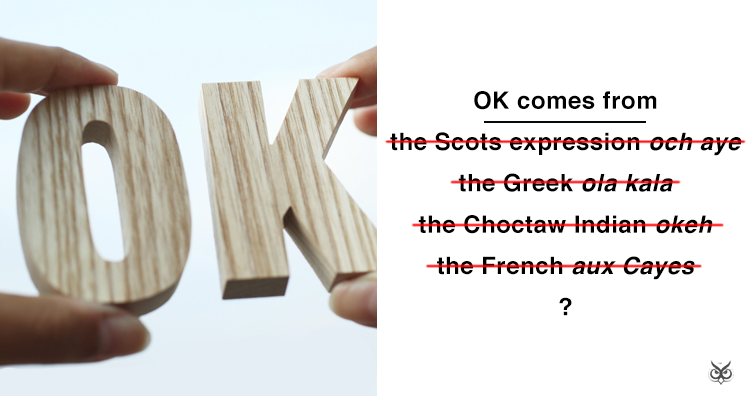A lot of countries have claimed the origin of the word OK. In fact, there’s an entire Wikipedia threat with more than 35 proposed etymologies of it.
From Greek immigrants sending letters back home stating that ‘everything’s good’ (Ola Kala in Greek) to the French port Aux Cayes, one can find numerous theories on the origin of the word OK. But the truth is that all of these theories lack evidence.
So where did OK come from? (the article continues after the ad)
According to lexicographers from Oxford Dictionaries, the term OK is an abbreviation of ‘orl korrekt’, a jokey misspelling of ‘all correct’ which was used in the US in the 1830s. The first time it was published was on March 23, 1839 edition of The Boston Morning Post. Just as today we use words such as ‘lol’ and ‘omg’, abbreviations in printing were used during the 19th century as well. For example, ‘i.s.b.d’ for ‘it shall be done’ or ‘r.t.b.s’ for ‘remains to be seen’.
But why did OK stuck while RTBS got lost?
For two reasons basically: a presidential campaign and the invention of the telegraph.
First of all, since it was a ‘viral’ abbreviation already used by the public, OK was chosen as a clever slogan by the Democratic party during the American Presidential election of 1840. You see, Martin Van Buren, their candidate, was nicknamed ‘Old Kinderhook’ (after his birthplace in Kinderhook, New York), so his supporters, formed the ‘OK Club’. Even though the slogan didn’t get President Van Buren re-elected, it definitely helped in popularising the word.
The other main reason that helped OK was the invention of the telegraph during that very time (in the 1830s-1840s). OK was perfect for the telegraph and it ended up being the word that was mostly used to acknowledge receiving a transmission.
If you like what you read, then you will definitely love this one: Why Pilots Use The Word ‘Mayday’ When In Emergency?
Photo: Huffington Post
Photoshop: I’m A Useless Info Junkie
Widget not in any sidebars

